Do the contents of a man’s billfold define him? Perhaps. In the case of my great uncle, Benjamin Walker Wyche (born August 29, 1914, and who passed away suddenly on February 21, 1977), the contents of his billfold seem to tell us a great deal about the man.
My Uncle Ben never married. Thanks to his exceptional good looks, his congenial personality, and his success in business and community work, he never had any shortage of admirers. His friends, brothers, and sisters all joked that he was still – even in his sixties – the most eligible bachelor in our hometown. Ben never lacked a date for any social function, and he was a great dancer; everyone said so. In addition to these charms, Ben had a clarion tenor singing voice which he used to great benefit in the church choir throughout his life. As a young man, I have been told, he sang barbershop quartet at Davidson College where he was a student and a member of the Pi Kappa Phi fraternity.
Ben was a lifelong member of the Weldon United Methodist Church. He ran a successful wholesale grocery supply business, served on the board of the Weldon Savings & Loan, and was a member of the Rotary Club and the Lion’s Club. Throughout his life he remained in the home he was raised in from boyhood, sharing it with his unmarried sister, Elizabeth, who kept house for them both. Ben traveled a good deal when he was given the opportunity. He made his way to Brazil, The Greek Islands and Italy, as well as England, Ireland, and France.
I never heard my uncle Ben say a disparaging word about anyone at all. He was a kind man, a gentle spirit, and those who knew him respected and admired him without needing to know more about him than just these surface facts.
My uncle Ben died suddenly of a massive coronary in 1977. As it turned out, twenty-five years after he passed, when his sister’s estate was being liquidated, I was given the opportunity to claim Ben’s personal effects. He never had children and no one else in the family ever expressed much interest in this bachelor uncles’ old records, photographs, or books. I cared. Ben was my favorite uncle.
Among his effects was his billfold, which when I came into possession of it, appeared exactly as it had the day Benjamin Wyche died in 1977. The object itself was unremarkable, much like the man who owned it. Just a worn, Amity brand leather billfold, containing all the most important and necessary items to a man’s daily living.
Here’s an inventory of the contents of Benjamin Walker Wyche’s billfold:
— Six dollars in cash.
— A handwritten note, containing a Nationwide Life Insurance Policy Number, and a telephone claim number.
— A handwritten note with a list of people’s names, mailing addresses, and telephone numbers. Interestingly, all the names are those of widowed elderly women in town, or unmarried middle-aged women.
— An appointment slip for a Doctor’s appointment, scheduled for two months after Ben died. (See below.)
— An extremely well-worn tithe record for the Weldon Methodist Church in the amount of five cents, dated May 25th, 1925. Ben was ten years old when he recorded this gift. It appears that Ben had been carrying around this sentimental little receipt for more than fifty years. (See below.)
— A handwritten slip listing his parents, all his siblings, and their spouse’s birthdays. (See below.)
— His social security card. (See below.)
— His driver’s license. (See below.)
— A flu vaccine record dated November 2, 1976.
— His draft card, originally issued in 1936. At the time of his death, Ben had carried this frayed fragment of a draft registration card more than forty years. (See below.)
— A Red Cross certificate of appreciation, indicating that Ben was a member of the “Gallon Club”. The certificate was issued on May 20, 1960. (See below.)
— A polio Vaccine record, dated 1964.
— Several insurance cards, for auto, health, life, etc.
— An identification card issued by the Halifax County Civil Defense Agency, listing Ben as “Chief Supply Service Member of Advisory Council”. It’s dated March 28, 1962.
— A tattered personal check paid to the order of Ben Wyche, in the amount of fifteen dollars. The check was drawn on the account of Mary E. Jones and endorsed by her, dated July 11, 1970. It was never cashed. (See below.)
Mary E. Jones was an African-American woman who was born in Greensville County, Virginia in 1893, but who lived most of her life in Weldon North Carolina, relocating to Weldon before 1910. She was a cook by profession, and poor.
Interestingly Ben Wyche’s parents also arrived in Weldon in the years before 1900, and also from Greensville County, Virginia. What was the relationship? It’s impossible to know for certain, but my suspicion is that Mary E. Jones’s people and Benjamin Walker Wyche’s people had long been connected. I believe that Ben *loaned* Mary money, never expecting or wanting repayment.
When this check was written by Mary to Ben, she was 77 years old. Ben passed away in 1977, after having carried this check in his wallet for seven years.
— Another tattered, very pocket worn check; this one a counter check, paid to the order of Ben Wyche in the amount of $25.00, and endorsed by Robert L. Pay on April 27, 1972. It was never cashed. (See below.)
Robert L. Pay arrived in Weldon, North Carolina sometime after World War II. Robert Pay worked for a time for my grandfather, John Ira Wyche (Ben’s brother). My mother recalled that he had a large family with many children, and that he might have worked for the railroad later in his life. I’ve been unable to find any certain information on where Robert L. Pay came from, or what became of him. When Ben passed away in 1977, he’d carried this uncashed check in his wallet for five years.
— The last uncashed check in Ben’s wallet is just as interesting and is even older than the previous two. The check was written on January 20, 1964, in the amount of $100.00. It was written to Merchants Distributing Company, Ben Wyche’s wholesale grocery supply business, so it can be assumed that the check was written for goods – food – rather than cash. The account holder and signature is Raymond Baty. (See below.)
I have been unable to confirm any certain information on this individual. The only thing I know is that in 1964, Raymond Baty wrote a check for $100 to my uncle Ben; a check that Ben chose not to cash and carried around in his wallet for thirteen years.
There was one more item in my uncle’s wallet, but we’ll reveal that item at the conclusion of this article. First I’d like to propose that a great deal can be gleaned from the contents of Ben Wyche’s wallet. We know he was loyal and generous. The checks he carried around with him all those years, checks he chose not to cash, paint a picture of a man who had empathy for those less fortunate than himself. He had a sense of his obligation to his fellow man.
He also seems to have a deep commitment to his community as a whole. His church was obviously very important to him. He was sentimental, saving little pieces of paper like the tithe record of a little boy’s contribution to the plate. You don’t hang on to shreds like this if they mean nothing to you. Similarly, you don’t donate gallons of blood to the Red Cross if you are only concerned with you own comfort and well-being.
He cared about his family and friends, making sure that he never overlooked a birthdate.
He cared something about the widows and spinsters in his town; women who, in that era, would have been seen as vulnerable and in need of some kind of masculine protection.
Reading his obituary, we learn that Benjamin Walker Wyche was a pillar of his community. He was trusted and well-respected by those that knew him only a little, and he was adored by those who knew him well. His brother, my grandfather, called Ben his “best friend” and I know that Ben was my grandfather’s rock during difficult periods. Papa was crushed when Ben died, and he never quite recovered from the loss of this dearest of brothers. The light went out just a little. And I know that more than just my grandfather felt this. Many others did too; among them most of Ben’s employee’s at Merchants Distributing Company, which was closed and liquidated following Ben’s death.
What can we say about a man from the contents of his wallet? A great deal I think.
The last item found in his wallet was found accidentally. It was never meant to be seen by anyone other than Ben himself. In the almost forty years since Ben’s death, the dry leather wallet began to disintegrate, as will happen. I feared for the documents inside, and so I removed them for safe keeping. The seams of the billfold had long since frayed and broken, and as I handled the thing, the bottom seam opened, revealing a hidden, secret compartment I had not previously noticed. Inside, two crumbling flaps of leather concealed a tiny photograph.
I present the photograph for your consideration.
This photo was taken in the late 1920’s, when Benjamin Walker Wyche was a student at Davidson College. I have no idea who the young man in Ben’s arms is. Perhaps someone can help me identify him. I do know that Ben must have cared a great deal about this image, as he carried it with him, secreted away from prying eyes, for more than fifty years. His most prized, most private, most sentimental possession.
What secrets do we carry around with us?
Old debts. Old promises. Obligations made and forgiven? And then this.
Benjamin Walker Wyche; pillar of the community, dedicated Methodist, loving brother, son, neighbor. A generous and decent man, respected by his employees and friends.
And by the standards of his era, a mentally ill, criminal deviant, who could have been incarcerated had he been outed.
Think about the life this man must have led. Think of the cloud of fear under which he lived. The undeserved shame that threatened everything and everyone he cared for.
Instead of allowing fear to make him angry and cynical, it made him a better person, a better neighbor, a better friend, boss, son, brother. He turned fear into generosity and warmth. There’s so much we can learn from this man’s courage.
How I wish I could see him again, to tell my favorite uncle just how much more I love and admire and respect him, now that I know.
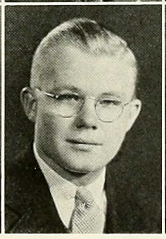
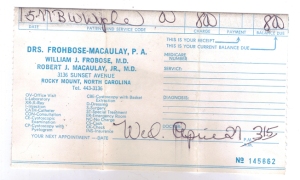
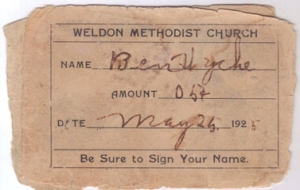
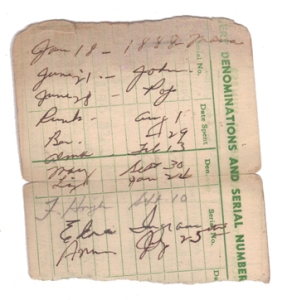
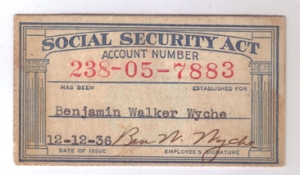
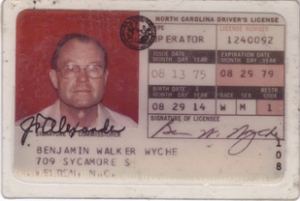
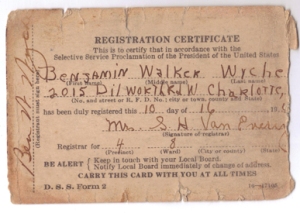
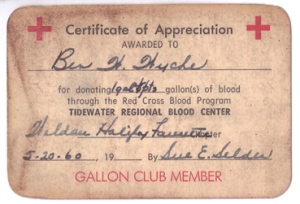
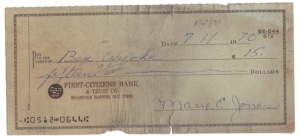
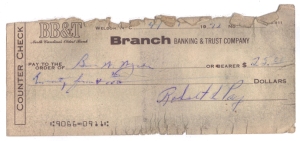
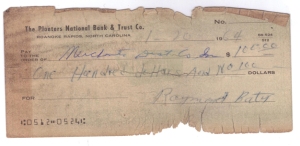
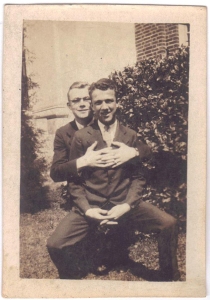

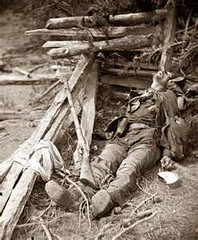

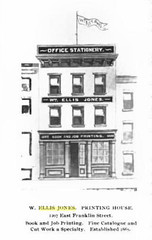






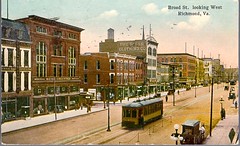
You must be logged in to post a comment.